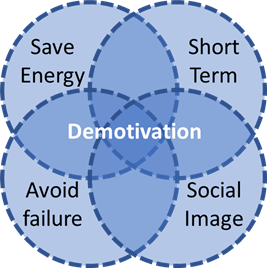This article is part of a series of articles on how to “speak” to our subconscious brain in a language it understands and hence reduce internal fights. We most often use “will power” to resolve those internal conflicts at a high cost while there are easier ways. You’ll find the links to other related articles at the end of this one.
If there was one soft skill that could change the world or at least your world, it would be your ability to manage your own frustration. It is at the core of everything we do.
Frustration is what keeps us from:
- Over-performing at work (exceeding the 10’000 hours threshold): long working hours, going the extra mile, dealing with (repetitive) failure…
- Learning new stuff: sometimes it’s too hard to read the next book, watch the next tutorial or to practice times and times again until getting it right.
- Meet new people (VC?): live through the frustration of potential rejection or being patient with people that annoy us.
- Trying new things only to find out it’s not what we initially expected.
- …
The list is endless. If you learn to manage your frustration, the world is yours, you can learn virtually anything, achieve the unachievable, entertain good relationships…
Managing frustration is the point of entry to any other soft or hard skill. Click to tweet
So let’s give it a shot!
OK then. Where shall we start?
The key idea is to adapt whatever we do to how our brain works. The general principle is that our subconscious brain’s first priority is survival. It controls our vital processes for that “sole” objective. Anything that comes in contradiction is rejected… We feel demotivated.
Maybe the easiest way to be motivated is to avoid being demotivated.
Click to tweet
Below are a few clues on how our subconscious brain works to ensure our survival. We’ll then use them as a base to build an action plan our brain cannot resist 😉.
Priority number 1: Save energy

As opposed to us, our ancestors lived in the jungle. When they felt hungry, food was not readily available in the refrigerator or at the local supermarket. Food is energy and because food supply was not guaranteed, energy supply was not either. No energy meant death. To avoid dying from starvation, our subconscious sends us signals to stop spending energy on whatever is not an absolute necessity: hunting, being hunted or reproduction. We then call those signals “demotivation”!
Priority number 2: focus on what matters most i.e. the short term (survival)

The promise of whatever future comfort, no matter how great, does not guarantee survival. Our brain is wired to focus on the present (short term) because it is what matters most. Future is a concept, not a reality (yet). Operating modes like “we’ll cross that bridge when will be there” is our natural way of thinking about the future.
Priority number 3: increase the odds of success and avoid doing stupid things that can kill you

Doing new stuff is not natural. Trying something new comes with a risk of failure. At best, failure means spending (precious) energy on unimportant stuff and at worst it can kill you. So whenever you want to try anything new, the subconscious brain makes sure you won’t.
Priority number 4: save our social image to avoid being rejected by the group

Doing stupid stuff can also make you rejected by the group and I can tell you, you won’t survive long living solo in the jungle. The caveman knew this and made sure it didn’t happen.
Summing up all 4 operating modes

ADAPTED ACTION STEPS
Having a look at the 4 above points, the most effective strategy for our brain to ensure survival is habits. So where should we start to establish new habits?
Priority number 1 “save energy” by managing your (healthy) energy
The more healthy energy you have the less your brain will resist spending it. But what is healthy energy? It is energy coming from:
- Physiological: sports, sleep, breathing properly, healthy food…
- Mental: meditation, social interactions…
- Motivational: passions, purpose, values…
Pick one in the list and introduce it into your current daily routine.
Priority number 2 “short term focus”: split goals into small tasks that are achievable within a short time frame.
- It quenches the need of your brain to focus on the short term.
- It reduces chances AND consequences of failure.
- It decreases the needed perceived energy.
Priority number 3 “avoid failure at any price”: adapt your belief system.
Chances you are going to get killed by doing stupid stuff have dramatically decreased since humans left the jungle. You need to change your belief system from the “by default” one inherited from our ancestors to a more “modern” one adapted to today’s reality.
My aim is not to give you the list of empowering believes to adopt, but many of them are available on the net. One well-known author in changing the belief system is Tony Robbins. Maybe you can have a look at his work.
Priority number 4 “social image”: self-worth as a sound base
Develop your self-worth so that you care less about what people think about you and more about what is of importance to you.
You will naturally focus on what could go right rather than what could go wrong.
What helped me in that regard, are positive affirmations as advised by Hal Elrod in his book Miracle Morning.
In parallel, I just heard about a true, yet anecdotal study about funerals. The primary factor that determines the number of people present at your funeral is not the love they have for you but rather the weather that day!!! And only 10% of attendees report caring enough about the dead to shed a tear. This gives you a few more reasons not to care about what people think about you while still alive 🙂.
TO SUM-UP
The importance of the 4 above points is that they address the exact demotivation factors linked to the intrinsic way our brain works. Taking them into consideration importantly decreases demotivation and hence strongly increases chances of success.
More readings on how to “manage” our brain:
- How to trigger my natural proactive me?
- Watch your words
- Choice-fully Use Your Will Power
- The (ultimate) guide to open-mindedness
If interested in learning how to work with your nature and not against it, check out my book at WorkWithYourNature.com
